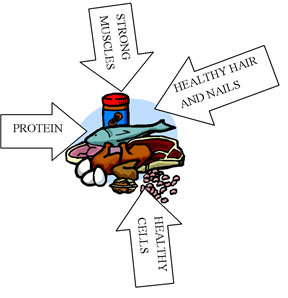High protein, low carbohydrate diets are the rage in our society. Marketing companies tout the benefits of this kind of diet on television and in print media. Protein is a good thing. It is an essential nutrient that our bodies need to thrive. Your body uses proteins to build cells, maintain tissues and synthesize new proteins that make it possible for you to perform basic bodily functions. Your ability to see hear, think and move require nerve cells to send messages to each other. The cells require neurotransmitters to send those messages. Making those neurotransmitters requires protein.
While the majority of Americans are meat-eaters, we could probably do with less of it in our diets. Extra protein does not help build muscle. It doesn’t make you stronger. Eat too much protein and you are probably just adding unnecessary calories and fat.
Protein does assist in most bodily functions but if 10-35% of your daily calories derives from protein, it should be enough. Think in terms of 46 grams per day for women and 56 grams for men (Center for Disease Control). It’s also good to spread your protein intake throughout the day. However, after age 60, changes are needed. We lose muscle mass as we age – from 1% per year after age 30 to twice that much by age 70. This is called sarcopenia. Our bodies need muscle mass for movement in walking, running, carrying things and even in sports. Without adequate muscle mass, our bodies become fragile in our senior years.
After age 60, aim for .05 grams of protein per pound of body weight. Keep in mind that 1 ounce of protein is equivalent to 7 grams. Women over age 60 should consume 7-8 ounces of protein derived from animals per day. Men over 60 need 10 -11 ounces.
Your body uses proteins to build cells, maintain tissues and synthesize new proteins that make it possible for you to perform basic bodily functions.
Your ability to see hear, think and move require nerve cells to send messages to each other. Those cells affect our skin and nails, as well. Even our bones are loaded with protein in the inner structure and marrow. The cells require neurotransmitters to send those messages. Making those neurotransmitters requires protein.
While meat is good, it does contain a lot of fat. Try getting some of your protein intake from sources other than animals. Legumes, plant proteins, dairy products and fish are good sources for the human body.
Eating too much protein can lead to weight gain, elevated blood sugar, stress on the kidneys and even stimulation of cancer cells. The key is balance….a balance between high-quality, grass-fed animal proteins and plant-based whole foods containing protein. The popularity of high-protein diets may give you false hope that you can’t consume too much protein, but the truth is that too much can prove detrimental to your overall health.
